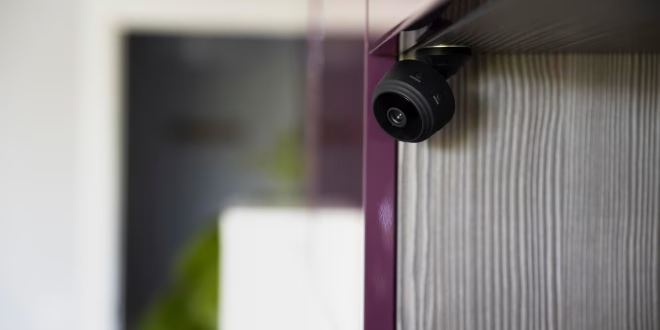Evelyn Harcourt had always believed that her home was her sanctuary—a carefully cultivated haven where every detail, from the soft hum of the refrigerator to the gleaming surfaces of her kitchen countertops, spoke of warmth and security. Nestled on a quiet street in the suburban neighborhood of Maplewood, her house was a blend of classic charm and modern convenience. For Evelyn, the kitchen was more than just a place to prepare meals; it was the heart of the home, a stage for both everyday rituals and moments of intimate reflection.
On a bright autumn morning, when golden sunlight spilled through the kitchen window and danced on the polished oak table, Evelyn prepared her customary cup of chamomile tea. That day, however, an unsettling discovery set her mind racing—a jar of artisan honey, which she remembered filling to the brim just the day before, now appeared oddly half-empty. At first, she attributed the anomaly to her own forgetfulness. Perhaps, she reasoned, she had used more than she recalled. Yet, as the days wore on, the inconsistencies began to multiply.
One afternoon, while arranging a new display of fresh herbs on the windowsill, Evelyn noticed that her carefully labeled spice jars no longer held the same abundance as before. A few of the small, expensive packets of saffron and truffle salt—the very ingredients reserved for special recipes—had inexplicably dwindled. The minor losses might have been dismissed as innocent oversights if they weren’t so persistent. Determined to make sense of the unfolding mystery, Evelyn started a small ledger on a blank notepad. Every missing item was recorded meticulously: the date, the item, and any observations that might hint at a pattern.
At first, the discrepancies involved everyday treats—a missing bar of dark chocolate here, an almost-vanished packet of gourmet coffee there. But soon, the losses took on a more disconcerting hue. Items that held not only monetary value but also emotional significance began to disappear without explanation. The jar of honey had been a favorite indulgence during quiet evenings, and a reserved bottle of vintage port, purchased with care for a forthcoming celebration, was no longer where it belonged. With every unexplained depletion, Evelyn’s unease deepened.
The kitchen—once a realm of calm efficiency—slowly morphed into a space of silent suspicion. Each cupboard and every neatly labeled jar became a potential stage for an unseen intruder. In the quiet moments just before sleep, when the house was hushed and the only sound was the steady tick of the clock, Evelyn’s mind would wander to unsettling possibilities. Had she inadvertently left a door unlocked? Could an outsider be pilfering the treasures of her culinary world? Or, more disturbingly, was someone she trusted exploiting the sanctuary she had so lovingly maintained?
As days turned into weeks, the pattern of disappearance grew bolder. A jar of imported marmalade vanished; premium cuts of cheese, reserved for a weekend soiree, were found partially consumed; even delicate crackers and carefully aged balsamic vinegar were inexplicably diminished. The slow erosion of her culinary stock was accompanied by a gnawing feeling of violation—a sense that the very essence of her home was being undermined.
Evelyn’s partner, Derek, was the first to notice her growing distress. During a quiet dinner one evening, as the soft clink of silverware punctuated their conversation, she broached the subject. “Have you noticed how some things just…disappear?” she asked gently, her eyes searching his face for any sign of recognition. Derek offered a warm smile and a shrug. “I’m sure it’s just our busy lives getting in the way. Maybe we’re not keeping track as well as we think,” he replied, his tone casual. Yet, despite his reassurances, Evelyn’s doubts only deepened.
Determined to reclaim the sense of control that had so long defined her life, Evelyn resolved to confront the mystery head-on. That evening, while the house lay shrouded in the soft glow of lamplight, she pored over her notebook. Each entry was a quiet testament to the encroaching unease. What had once been trivial oversights now formed a consistent narrative—a systematic erosion that left her with more questions than answers. The kitchen, which had always been her cherished retreat, was now haunted by the whisper of absence.
In that stillness, amid the quiet ticking and her scribbled notes, Evelyn felt the first stirrings of a resolve that would soon lead her down an unexpected path. The gentle clamor of her once-trusted space was gradually being replaced by a silent alarm—a call to arms that demanded she protect her home, her memories, and her identity. As she closed her notebook and looked around at the familiar surroundings, a profound determination took root. She would discover the truth behind these disappearances, no matter how deep the mystery ran or how personal the betrayal might prove to be.
And so, with the steady pulse of determination echoing in her heart, Evelyn began the first steps of an investigation that would soon unravel a tapestry of secrets, challenges, and painful revelations—one that would force her to question not only the sanctity of her home but also the very fabric of the relationships that had once defined her life.
Stirrings of Suspicion
In the weeks following her initial discoveries, Evelyn’s life began to take on the slow, deliberate cadence of a detective’s investigation. Each day, as she moved through her familiar routines, her senses were sharpened to every detail—every jar, every shelf, every drawer seemed to whisper hints of a hidden narrative. The once-comforting clink of utensils and the rustle of paper towels now carried an undercurrent of uncertainty. Evelyn found herself lingering longer in the kitchen, scrutinizing every inch of her meticulously organized space.
Her ledger had become both a confidante and an adversary. The pages, filled with dates and descriptions of each mysterious depletion, were a chronicle of mounting unease. The list began with small, seemingly insignificant items: a few missing chocolates, a packet of gourmet tea leaves that had vanished overnight. But then, as if testing the limits of her patience, the disappearances grew bolder. The jar of honey, once a staple of her pantry, had been reduced to a shadow of its former self. Even more disconcerting was the gradual disappearance of premium ingredients—exotic spices, aged vinegars, and that cherished bottle of vintage port, now reduced to an empty decanter.
Each anomaly sparked a new round of internal debates. Evelyn questioned her own memory—was she simply misplacing these items in the haste of daily life? Had she, in moments of distraction, set something down in a different place? Yet, every time she double-checked, the evidence was unyielding. The loss was real, and it followed a pattern that was too deliberate to be mere oversight.
Late one evening, as rain softly tapped against the window panes, Evelyn decided to share her growing concern with her closest friend, Marissa, over a phone call. Marissa listened intently as Evelyn recounted the sequence of events, the precise details of each missing item, and the mounting anxiety that now clouded every meal and every moment in the kitchen. “It almost feels like someone is picking through your treasures, Evelyn,” Marissa remarked, her tone laced with both curiosity and concern. “But who could do that? And why would they risk disturbing something so personal?”
The conversation only deepened Evelyn’s sense of isolation. If an intruder were responsible, what kind of person would have the nerve to invade the sanctity of her home? And if it wasn’t an outsider, could it be someone she knew? Her thoughts turned, with increasing disquiet, to those who had free access to her life—a circle that included not only Derek but also his family, who visited more often than she had ever considered problematic. It was a delicate thought, one that made her pulse quicken with a mix of betrayal and sorrow.
The situation reached a turning point one crisp Saturday morning. As Evelyn prepared to set the table for a quiet breakfast, she discovered that a small jar of imported marmalade—an indulgence saved for special occasions—was nowhere to be found. The jar’s empty space on the shelf was a stark reminder that the mystery was no longer about minor inconveniences; it was an escalating pattern of calculated intrusions. With trembling hands, she recorded the latest discrepancy in her notebook, her pen scratching out a message that felt more like a warning than a simple note.
That night, as the house settled into its usual quiet, Evelyn’s mind churned with conflicting emotions. She felt a rising determination to reclaim control over her home, but also a gnawing fear of what—or who—might be behind these acts. Sleep eluded her as she lay in bed, the shadows in her room dancing to the rhythm of her turbulent thoughts. The more she considered the possibility of an insider—a familiar face with easy access—the more her heart ached with a sense of profound betrayal.
Derek, ever the optimist, tried to dismiss her worries the next morning. “It’s probably just a misunderstanding,” he said as they sipped their coffee. “We’re both so busy, and sometimes things get misplaced.” But his gentle words did little to soothe the growing storm inside Evelyn. Her intuition told her that these were no ordinary accidents, and that beneath the veneer of everyday life lay a hidden agenda.
Determined to leave no stone unturned, Evelyn began to discreetly question the small details of her household routines. She observed when the family arrived and left, the habits of visitors, and even the subtle differences in the way light filtered into the kitchen at different times of day. Every detail was catalogued in her mind, a silent inventory of suspicion that grew more intricate with each passing day.
As autumn deepened outside and the days grew shorter, Evelyn realized that the steady stream of minor intrusions was gradually evolving into something more personal. It wasn’t simply about the loss of food or cherished ingredients—it was about the erosion of trust and the quiet violation of a space that was entirely her own. With a heavy heart, she acknowledged that she might soon have to face a truth she had long feared: that the boundaries she had so carefully drawn around her life were being breached by someone she never expected.
In that dimly lit kitchen, amidst the soft glow of a single overhead light, Evelyn’s resolve solidified. Whatever the cause of these disappearances, she would uncover the truth. Her sanctuary, her heart of the home, deserved nothing less than the full measure of her determination. And as the night deepened, so did her commitment—to protect every cherished jar, every bottle, and every memory that made her home the safe haven it once was.
A Pattern Unfolds
Over the following fortnight, the series of vanishings began to reveal an unsettling pattern. Evelyn’s ledger, once a casual note of minor losses, now read like a carefully documented case file. Each entry was more alarming than the last—a dwindling of premium ingredients, cherished delicacies, and even small personal items that had been stored away in the kitchen for safekeeping. The consistency of the discrepancies left little room for doubt: this was no random misplacement or oversight. A deliberate, systematic intrusion was at work.
The turning point came on a rainy Wednesday afternoon. As Evelyn prepared to experiment with a new recipe, she reached for a rare jar of sun-dried tomato pesto—a prized ingredient she had acquired on a special trip overseas. Her hand met only an empty space on the shelf. The jar was gone. For a moment, she simply stood there, frozen by disbelief, as the echoes of every previous disappearance converged into a single, undeniable reality. This was no accident; it was an invasion of the intimate world she had so lovingly curated.
Determined to piece together the puzzle, Evelyn began to retrace her steps. She meticulously inspected every nook and cranny of her kitchen—from the rarely opened top shelf above the refrigerator to the lower cabinets where she stored bulk items. The more she searched, the more she realized that the intrusions were both calculated and precise. Nothing appeared to be stolen by chance; every missing item held a certain quality—a premium ingredient or a delicacy that she reserved for moments of celebration or quiet indulgence.
In an effort to make sense of it all, Evelyn started to map the timeline of the disappearances. She noted that the intrusions seemed to occur during periods when the house was least likely to be closely monitored—late afternoons when Derek was at work, or late at night when the rest of the household had settled down. A chill ran down her spine as she realized that the intruder was striking with a disturbing regularity, almost as if they knew the rhythms of her home intimately.
Late one evening, while reviewing her detailed notes in the soft glow of a desk lamp, Evelyn considered the unsettling possibility that the culprit might be someone from within her own circle. The thought was nearly unbearable. Derek, her supportive partner, had always been her rock, yet his family had easy access to their home—a fact that had never before raised any alarms. But now, every statistic, every missing jar, pointed to a betrayal that could only come from someone with intimate, unrestricted access.
The more Evelyn pondered the situation, the more she began to feel as if her home were no longer a private refuge but a stage for a clandestine drama—a drama that unfolded in the silence of the night. The very walls of her kitchen seemed to whisper secrets, and each creak of the floorboards carried the weight of a hidden narrative. With each passing day, the mounting evidence painted a picture of an intrusion that was both calculated and deeply personal.
Evelyn’s inner turmoil was mirrored by subtle changes in the atmosphere of her home. The once-comforting scent of freshly brewed coffee in the morning now mingled with a faint, unplaceable odor—a blend of expensive spices and something metallic. The familiar sound of the refrigerator’s hum took on an eerie resonance, as if it were marking the passage of time until the next disappearance. Every detail, no matter how small, was a reminder that the sanctity of her space was under siege.
Despite her mounting anxiety, Evelyn knew that she could not confront the mystery with blind fear. She had to act, and she began to weigh her options. The idea of installing some form of surveillance crept into her mind—a way to capture the elusive presence that roamed her kitchen in the quiet hours of the night. Yet the thought brought with it a swirl of ethical and emotional dilemmas. Was it truly acceptable to turn her home into a stage for hidden cameras? And what would it mean for the trust that she had always placed in the people around her?
Still, as the evidence piled up and her nights became restless with worry, the idea grew more compelling. If she could capture definitive proof of the intrusions, then she might finally be able to confront the truth head-on, whatever its nature. The decision weighed heavily on her heart. She recalled all the nights spent lying awake, haunted by the possibility that someone she knew was violating the very core of her personal space.
In the quiet solitude of that rainy night, with the steady patter of droplets on the window, Evelyn made a silent vow. No longer would she allow the mysterious disappearances to erode her peace of mind. Every missing jar, every fading label, was a call to action—a challenge to reclaim the sanctity of her home. With her notebook clutched tightly in hand and her resolve hardening with each passing moment, she resolved that the next step was inevitable. The intruder, whoever they were, would be unmasked, and the secrets hidden in the silence of her kitchen would finally be brought to light.
The Hidden Lens
The following day, with a determination born of sleepless nights and whispered fears, Evelyn set about gathering the tools she believed might finally unveil the mystery. After extensive research and several long phone calls to trusted experts in home security, she purchased a compact, wireless camera—a device small enough to be concealed, yet powerful enough to capture every subtle movement. Its sleek design promised discretion, and its advanced features gave her hope that she might soon see with clarity the hidden choreography of theft and intrusion that had upended her world.
In the soft light of early evening, while Derek was away on one of his business trips, Evelyn prepared to transform her kitchen into a space of both vigilance and vulnerability. Choosing a spot behind a collection of her favorite cookbooks on a high shelf, she carefully positioned the camera so that its lens would have an unobstructed view of the pantry and the refrigerator. The placement was chosen with deliberate care—strategically hidden among everyday objects so as not to raise suspicion, yet perfectly positioned to capture any clandestine activity.
As she adjusted the settings and verified the live feed on her phone, a torrent of mixed emotions surged through her. The act of placing the camera felt both like a necessary measure of self-defense and an intrusion into the sanctity of a space that had long been her refuge. Still, the need for truth eclipsed her hesitations. With a steadying breath and a silent plea for clarity, Evelyn secured the camera in place, its red light a small, defiant beacon in the dimming light of dusk.
That night, as the house settled into its familiar hush and the only sound was the soft murmur of the wind outside, Evelyn found herself nervously glancing at her phone. Every time it buzzed with a new notification, her heart skipped a beat, and she rushed to check the live feed from the hidden lens. The minutes stretched long and anxious, the quiet of the house suddenly filled with a tension that was both palpable and unnerving.
Several hours passed without incident until, in the predawn darkness, her phone vibrated with an unexpected alert. With trembling fingers, she unlocked it and pulled up the live feed. There, emerging from the shadowed hallway, was a figure moving with quiet confidence through the kitchen. At first, the image was blurry—a mere silhouette against the soft backdrop of shelves and counters—but as the figure drew nearer, Evelyn’s breath caught in her throat. The person was not an intruder in the conventional sense; there was an undeniable familiarity in the gait, a subtle grace that betrayed a well-known presence.
Her mind raced through possibilities. Could it be a friend or a neighbor? The figure moved with such assured ease that it seemed they belonged there. But as the camera captured the figure’s deliberate actions—the careful selection of a bottle from a shelf, the methodical scanning of the kitchen—a crushing realization began to dawn upon her. This was no random trespasser. The intruder was someone with intimate knowledge of the layout of her home—a face that should have been a source of comfort, not suspicion.
Even as her heart pounded in her chest, Evelyn forced herself to watch, her eyes wide with a mixture of disbelief and dread. The camera’s lens followed the intruder as they moved from the pantry to the refrigerator, pausing briefly as if to consider a prized possession, before disappearing around the corner of the room. The feed continued, capturing every subtle movement, every deliberate gesture, as if the intruder were performing a quiet, well-rehearsed routine.
In that moment, Evelyn’s mind reeled with questions. Who was this person? How did they come to have such unhesitating access to her home? And, most painfully, why would someone she had once trusted violate the boundaries of her private sanctuary? The implications were staggering. This was not the work of an opportunistic burglar or a stray animal drawn by the scent of gourmet ingredients. No, the intruder’s actions hinted at a far more personal, and deeply unsettling, betrayal.
With a mounting sense of dread, Evelyn realized that the figure on the screen was not a stranger at all. The familiar contours of the face, the subtle tilt of the head, the fluid movements—all pointed unmistakably to someone she had seen many times before, someone whose presence in her life had been taken for granted. As the feed continued, the intruder’s identity began to crystallize in Evelyn’s mind, and with it came a flood of emotions—shock, sorrow, and a deep, painful betrayal that threatened to shatter her carefully constructed world.
Unable to tear her eyes away from the unfolding scene, Evelyn clutched her phone tightly as the camera recorded every moment. The quiet efficiency of the intrusion was now undeniable evidence—a digital trail that could no longer be ignored. In the silent sanctuary of her kitchen, the hidden lens had captured a truth too terrible to dismiss: the sanctity of her home had been violated by someone whose loyalty and love had once been unquestioned.
The realization settled over her like a heavy shroud. As the figure faded from view, disappearing into the darkness of another room, Evelyn’s thoughts swirled with the implications of what she had witnessed. The next steps were painfully clear. The betrayal was intimate, personal, and it demanded to be confronted. And so, with a resolute heart and tears of anguish hidden behind determined eyes, Evelyn prepared herself to face the truth—no matter how deeply it cut into the fabric of her cherished life.
Revelation in the Shadows
The following morning brought with it a heavy sense of inevitability. The revelations captured by the hidden camera had shaken Evelyn to her core, and as dawn broke, she found herself compelled to confront the one person whose involvement she had never dared suspect. That person was Linda Mercer—the woman who had long been a fixture in her life, a mother-in-law whose visits were always cordial and filled with well-meaning advice. Now, the evidence suggested, Linda had been stepping over the invisible boundaries that separated hospitality from intrusion.
Evelyn’s hands trembled as she replayed the footage on her phone, every frame a silent accusation. Linda moved through the kitchen with an ease that suggested both familiarity and a disregard for the private sanctum that Evelyn had so carefully maintained. The images were clear and damning: Linda selecting premium ingredients as if they were meant for her own indulgence, pausing to examine a cherished bottle of port, and even lingering in areas of the home that had always been strictly off-limits.
The shock was compounded by the intimacy of the act. Linda was not a shadowy criminal lurking in the night—she was a trusted family member, someone who had been invited into the home time and again without a second thought. The realization stung with a betrayal that cut deep, shaking the very foundation of Evelyn’s trust. In that quiet morning light, every memory of previous family gatherings, every seemingly innocuous visit, was reinterpreted through a lens of disquiet and hurt.
Before the day had fully begun, Evelyn resolved to confront Linda. Yet even as she steeled herself for the confrontation, a torrent of emotions flooded her—anger, sorrow, confusion, and a desperate longing for an explanation. How could someone so close to her breach the sanctity of her private life in such a calculated manner? The questions piled up relentlessly, and with them, the weight of the betrayal became almost unbearable.
That afternoon, when Linda arrived as she often did on a weekly visit, Evelyn’s resolve hardened. In the quiet of the entryway, with the soft light filtering through the windows, Evelyn met Linda’s warm smile with a guarded, somber expression. “Linda,” Evelyn began, her voice low but unwavering, “we need to talk.”
Linda’s smile faltered, and she offered a puzzled look. “Of course, dear. Is something wrong?” she asked, the question laced with concern yet tinged with an undercurrent of something else—perhaps defensiveness.
Inside, in the privacy of the living room where the conversation would unfold, Evelyn recounted the events as she had observed them through the hidden lens. She described, in as calm and measured a tone as she could manage, how she had seen Linda in the kitchen during those unguarded hours—the deliberate selection of items, the casual but invasive perusal of areas that were meant to be private. With every word, the distance between them seemed to widen, as if the warm, familiar bond was slowly giving way to an unspoken chasm of hurt and betrayal.
Linda’s reaction was a mixture of shock and indignation. “I don’t understand,” she protested, her voice wavering. “I’ve only ever come here to help, to check that everything was in order. I never meant to intrude on your privacy.” But even as she spoke, her eyes darted around as if searching for a justification that could absolve her of responsibility. Evelyn’s calm determination left no room for evasions. The evidence was irrefutable, and every unspoken word hung heavily in the space between them.
The conversation soon escalated into a confrontation that cut through years of assumed familiarity. Evelyn’s questions became pointed and unyielding, demanding to know how Linda had come by the means to access areas of the home that were meant to be off-limits. The answer, when it came, was as shocking as it was cold. Linda confessed that, on several occasions, she had been given a spare key—one that had been offered by Derek, ostensibly for emergencies. The revelation struck Evelyn like a blow. Not only had Linda violated the sanctity of her home, but Derek, the person she trusted most, had unwittingly become complicit in this breach.
The confession deepened the wounds. Linda’s attempts at justification fell flat in the face of the stark reality captured on camera. The conversation devolved into bitter recrimination, with Evelyn demanding accountability and Linda offering a series of half-hearted apologies and feeble explanations. The dialogue was punctuated by long, painful silences—a mutual recognition of the deep-seated betrayal that now lay bare between them.
As the confrontation reached its climax, the room was filled with the raw sound of unspoken grief. For Evelyn, the betrayal went beyond the theft of ingredients; it was an invasion of the sanctity of her private life—a violation of the space where she had stored not only food, but memories, dreams, and the essence of her identity. And as Linda left that afternoon with heavy steps and a cloud of remorse hanging about her, Evelyn was left to pick up the shattered remnants of trust.
The Confrontation
The fallout from the painful confrontation with Linda was swift and disorienting. In the quiet hours following Linda’s departure, Evelyn found herself caught in a whirlwind of conflicted emotions. The raw anger, tinged with sorrow, was compounded by a crushing sense of betrayal—not just by Linda’s actions but by the realization that her sanctuary had been violated from within. That night, as shadows crept across the living room and the silence grew thick with unsaid words, Evelyn felt an overwhelming need to confront the man who had unknowingly set these events in motion.
Derek returned home later that evening to find Evelyn waiting in the dim light of the hallway. The tension in the air was palpable, each step echoing with the weight of unspoken accusations. When their eyes met, Derek saw a depth of hurt and resolve that he had never witnessed before. “We need to talk,” Evelyn said softly, her tone steadier than she felt.
Seated across from each other at the small kitchen table—a space that now felt both familiar and foreign—Evelyn laid out the evidence with deliberate care. She showed Derek the recordings, the ledger, and every detail that chronicled the slow disintegration of her once-secure sanctuary. With each item presented, his expression shifted from disbelief to quiet dismay. The realization that his own gesture—a spare key offered out of love and trust—had paved the way for such intrusion was a bitter pill to swallow.
Derek’s initial shock gave way to defensiveness, and soon, the conversation grew heated. “I never imagined that something like this could happen,” he insisted, his voice rising in a mixture of regret and anger. “I only ever wanted to help, to be prepared for emergencies.” But Evelyn’s eyes, glistening with a mixture of pain and determination, spoke louder than words. “Emergencies shouldn’t come at the expense of my privacy, Derek,” she replied, her voice cracking under the weight of accumulated hurt. “I trusted you with the sanctity of my home, and now I’m left questioning everything.”
The dialogue that ensued was fraught with painful admissions and half-hearted justifications. Derek acknowledged his mistake—a lapse in judgment born out of a desire to be helpful that, in retrospect, had blinded him to the potential consequences. Yet, the damage was done. The breach had fractured the delicate balance of trust that had always been the bedrock of their relationship. In the quiet moments between the heated words, both realized that this was more than a simple misunderstanding—it was a fundamental rift that would require time, transparency, and a renewed commitment to redefining their boundaries.
For Evelyn, the confrontation with Derek was a crucible. It forced her to confront the fragility of the trust she had taken for granted, and to reckon with the reality that sometimes, those closest to us can inadvertently become the agents of our deepest pain. The realization was sobering and left her with a resolve to reclaim not just her physical space but her emotional autonomy as well. In that intimate, painful exchange, she vowed to rebuild what had been broken, piece by piece, even if it meant facing uncomfortable truths about those she loved.
As the night wore on and the conversation reached its natural, albeit painful, pause, the house seemed to settle into a new kind of silence—a silence heavy with the promise of difficult, necessary change. In the wake of the confrontation, Evelyn and Derek both understood that the path to healing would be long and fraught with challenges. But the first step—acknowledging the betrayal and its impact on their shared life—had been taken, and that was something neither of them could ignore.
Aftermath and Reflection
In the days that followed, the atmosphere in the house was markedly different. The familiar hum of daily life was now punctuated by an undercurrent of tension, as both Evelyn and Derek grappled with the emotional fallout of recent events. The once-inviting kitchen, filled with the aroma of home-cooked meals and memories of happier times, now seemed to hold echoes of betrayal and the quiet pain of shattered trust.
Evelyn spent long hours in quiet reflection. With the ledger in hand and the hidden camera’s recordings stored on her phone, she combed through every detail, searching for a glimmer of understanding in the painful narrative that had unfolded in her own home. Each entry was a stark reminder of the gradual erosion of her safe space—a space that now felt both fragile and contested. In the solitude of the early morning hours, as the sun struggled to break through the dark, Evelyn found herself questioning not only the actions of others but her own role in allowing the boundaries of her sanctuary to be breached.
At the same time, Derek wrestled with his own guilt and regret. His attempts to offer explanations and apologies were met with a mix of skepticism and sorrow from Evelyn, who was determined to reclaim her sense of security. The shared living room became the stage for long, quiet conversations—conversations in which both partners slowly began to unburden themselves of the pent-up pain that had accumulated over weeks of silence and denial.
One afternoon, as the autumn rain tapped softly against the windows, Derek suggested they sit together and review the events that had led them to this juncture. With heavy hearts, they revisited the moments of intrusion—the inexplicable disappearances, the recordings that revealed Linda’s stealthy visits, and the painful confrontation that had shattered their mutual illusions of safety. In that shared space of vulnerability, the two began to understand that the incident was not simply about the loss of cherished ingredients or a breach of privacy. It was, at its core, about the slow disintegration of trust—the very foundation of a home built on mutual respect and care.
Evelyn found solace in small acts of reclaiming her space. She rearranged the kitchen, repositioning the items that had once been taken for granted and installing additional locks and alarms. Each physical change was a small victory, a tangible step toward reestablishing control over an environment that had felt so invaded. Yet, for all the practical measures, the emotional wounds ran deep, and the process of healing was as much about mending the heart as it was about fortifying the home.
In the midst of this reflective period, Evelyn sought the counsel of a trusted therapist, someone who specialized in helping individuals navigate the complexities of trust, loss, and recovery. In the safe space of those sessions, she began to untangle the tangled threads of her feelings—anger, sorrow, confusion—and to learn how to set new boundaries, both within herself and with those around her. The therapist’s gentle guidance provided a roadmap for rebuilding the inner sanctuary that had been so brutally compromised.
For Derek, the journey toward redemption involved confronting his own failings. He made a concerted effort to communicate more openly with Evelyn, sharing his own regrets and working to understand the depth of her hurt. Their conversations, though often painful, laid the groundwork for a gradual reconciliation—a recognition that trust, once broken, could only be rebuilt through transparency, mutual accountability, and a shared commitment to honoring personal boundaries.
In the quiet aftermath of confrontation, both Evelyn and Derek came to recognize that the intrusion into their home was more than a series of isolated events. It was a manifestation of deeper issues—of blurred lines between hospitality and overreach, of unspoken expectations, and of the delicate balance between familial closeness and personal privacy. The experience had forced them to examine the very foundations of their relationship, challenging them to redefine what it meant to feel secure and respected in the space they called home.
Reconstructing Trust
Determined to reclaim not only their home but also the sanctity of their relationship, Evelyn and Derek embarked on a journey of rebuilding trust—both within themselves and between each other. The first tangible step was to secure the physical space. Derek arranged for all the locks to be replaced and ensured that every key in circulation was accounted for. This practical measure, though it could never erase the memory of betrayal, symbolized a commitment to protecting what was most precious.
With the physical security reinforced, the couple began to address the emotional breaches that had so deeply wounded their lives. They set aside dedicated evenings for candid conversation, during which they discussed their fears, their disappointments, and the hope that they could one day restore the warmth of their shared sanctuary. These dialogues, though painful, served as the slow mending of a rift that had threatened to engulf them both.
Evelyn continued her therapy sessions, finding strength in the process of introspection and the gradual reassertion of her personal boundaries. Her therapist encouraged her to view the experience not solely as a violation but as an opportunity to reimagine the space she inhabited—both physically and emotionally. As she rearranged her kitchen and refined her daily routines, Evelyn began to see her home as a canvas for renewal—a place where the lessons of the past could inform a more secure and honest future.
Outside the walls of their home, the couple initiated a series of family meetings. With a mix of trepidation and resolve, they invited close relatives to openly discuss the events that had transpired and to renegotiate the boundaries that governed their visits. These meetings were fraught with tension, as long-standing habits and assumptions were challenged. Yet, in the candid exchange of feelings and expectations, there emerged a collective understanding that respect for personal space was paramount—a realization that transcended individual grievances and spoke to the need for a healthier, more transparent family dynamic.
Over time, the acts of rebuilding became ritualistic. Every new lock installed, every family meeting held, every honest conversation shared between Evelyn and Derek was a step toward reconstructing not just their home, but the trust that had once seemed irrevocably broken. The journey was not without setbacks—moments when old wounds flared up and doubts threatened to resurface—but with each challenge, they grew more resilient. The process taught them that healing was neither linear nor instantaneous; it was a mosaic of small victories, painstakingly assembled over time.
As the seasons changed and the first hints of spring began to brighten the landscape, Evelyn noticed that the once-haunted silence in the kitchen was slowly giving way to a tentative hope. The space, reconfigured and resecured, began to feel familiar again—a place where new memories could be forged, unmarred by the echoes of betrayal. The changes were subtle but profound: a reorganization of the pantry, the introduction of new routines, and a more mindful approach to every detail of their shared life.
In the midst of this slow but steady reconstruction, Evelyn found herself reflecting on the nature of trust. She recognized that while physical security could be fortified with locks and cameras, emotional security required vulnerability, forgiveness, and the courage to face uncomfortable truths. Through therapy, honest dialogue, and the unwavering support of Derek, she learned that trust could be rebuilt—but only if every party was willing to acknowledge past mistakes and commit to a future of transparency and mutual respect.
New Boundaries, New Beginnings
With the past slowly receding into painful memory, Evelyn and Derek embraced the challenge of establishing new boundaries—both within their home and in their family relationships. The experience had imparted a hard-won lesson: that intimacy and trust required continuous nurturing, clear communication, and, above all, respect for personal space.
They began by drafting a set of house rules, a tangible guide for all who entered their home. These rules, created together over several quiet evenings, addressed everything from key distribution to designated private spaces. In the process, both partners discovered that establishing clear expectations not only protected their home but also laid the groundwork for more honest and compassionate interactions with those they loved.
The family meetings, once fraught with tension, gradually evolved into a forum for open dialogue. Relatives, who had previously taken the gift of unrestricted access for granted, listened attentively as Evelyn and Derek shared their experiences. The conversations were raw and unfiltered—filled with apologies, questions, and even tears—but they also forged a renewed understanding. Over time, the meetings became less about assigning blame and more about setting a collective commitment to honoring the personal boundaries that made each home a true sanctuary.
For Evelyn, these moments of shared vulnerability were transformative. They taught her that reclaiming her home meant more than fortifying physical spaces—it required a holistic rebuilding of trust that extended into every facet of her life. With each honest exchange, she found herself growing more confident, more resolute in her right to protect her private world. And while the scars of betrayal would always linger as a reminder of past wounds, they no longer held dominion over her sense of self.
In the months that followed, the couple introduced new traditions—quiet family dinners where everyone was encouraged to share their feelings, joint outings that celebrated the beauty of renewed trust, and even a small garden planted together as a symbol of growth and resilience. Each act was a testament to the power of starting afresh, of carving out spaces in the midst of life’s chaos where honesty and respect could flourish.
As summer’s warmth enveloped Maplewood and the days stretched long under a forgiving sun, Evelyn began to see her home in a new light. The kitchen, once a stage for pain and suspicion, was slowly reclaiming its old role as a place of nourishment, creativity, and shared joy. Every jar, every spice, every carefully arranged corner was now imbued with a renewed significance—a promise that despite the shadows of the past, the future could be bright and unburdened.
And so, as the days unfolded into a tapestry of small, deliberate acts of trust and renewal, Evelyn and Derek discovered that even the deepest wounds could give way to new beginnings. With clear boundaries and an unwavering commitment to open communication, they rebuilt not only the physical security of their home but the emotional architecture that held their lives together.
A Home Reclaimed
In the gentle light of an early autumn morning, as golden leaves danced in the crisp breeze outside, Evelyn stood at the threshold of her kitchen—a room that now radiated a sense of peace and reclaimed authority. The scars of past betrayals still whispered faintly in the corners, yet they had been transformed into quiet reminders of her resilience and her capacity to rebuild. Each carefully arranged jar, each newly installed lock, was a symbol of her journey toward reclaiming not only her home but her own sense of self.
Evelyn’s days took on a renewed rhythm—a balance of cautious optimism and hard-earned wisdom. The daily rituals that once felt tainted by suspicion were slowly restored to their former grace. In the soft clatter of preparing a meal, in the laughter shared with Derek over a simple breakfast, she rediscovered the power of reclaiming her personal space. Every moment became an act of defiance against the memories of intrusion—a statement that her sanctuary, built with so much love and care, was hers to protect and nurture.
Family gatherings, too, took on a different tone. The once-tense conversations about boundaries had given way to a more mindful exchange of expectations and respect. Relatives now approached visits with a renewed sense of awareness, and the shared commitment to honoring each other’s privacy fostered a more harmonious environment. In those gatherings, as stories were shared and laughter filled the rooms, Evelyn saw that healing was not only possible but transformative.
For Derek, the journey had deepened his understanding of trust and responsibility. His own missteps had served as a harsh lesson in the importance of clear communication and the delicate balance between helpfulness and overreach. Together, he and Evelyn forged a path forward—a path that embraced the complexities of love and the ongoing effort required to protect what was sacred. With every new day, their bond grew stronger, built on the firm foundation of honesty, accountability, and mutual respect.
In a quiet moment one evening, as twilight softened the edges of the day, Evelyn took a final, reflective look around her kitchen. The space that had once been a battleground for betrayal and suspicion now shimmered with the promise of renewal. The hidden camera, once a silent witness to intrusions, was now tucked away—a reminder of a difficult chapter that had ultimately led to growth and a deeper understanding of the importance of boundaries.
As she closed the door behind her that night, Evelyn felt a profound sense of closure—a recognition that her home was once again a place where she could live fully, without fear or compromise. The journey had been long and fraught with painful revelations, but it had also been a testament to the strength of the human spirit and the enduring power of trust when nurtured with care.
In the end, the story of that troubled season became a quiet legend in her own life—a narrative of betrayal and heartache that had given way to resilience and hope. And as the seasons turned, bringing with them the promise of new beginnings, Evelyn carried with her the hard-won lessons of the past: that a home is not defined solely by its physical walls but by the love, respect, and unwavering commitment of those who dwell within.
A Home Reclaimed had become more than a title—it was a lived reality. In every sunrise that graced her kitchen, in every shared meal and every heartfelt conversation, Evelyn celebrated the triumph of reclaiming her space, her identity, and her future. The echoes of betrayal had softened, replaced by the gentle cadence of renewed hope and the steadfast belief that, even in the face of intrusion, the human spirit could rebuild, recover, and ultimately, reclaim the sanctuary that is home.
 Viral Hatch US/UK No.1 News Portal
Viral Hatch US/UK No.1 News Portal







